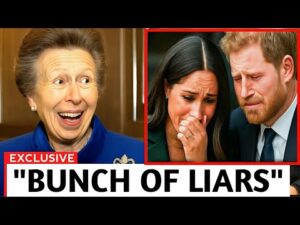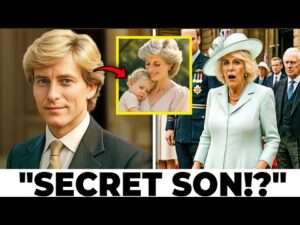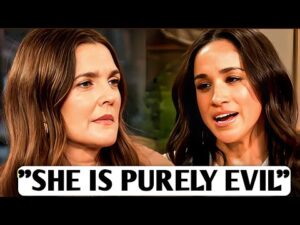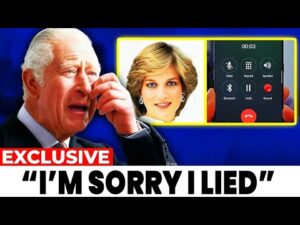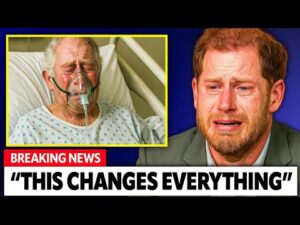House of Lords Just Voted—Prince Harry Officially OUT of Royal Family

Plans to flex his muscles and wipe his weward brother Prince Harry and his power hungry wife Megan from what if I told you the British government just took its first official step to erase Prince Harry’s royal identity forever. Just moments ago, the House of Lords ignited a constitutional firestorm by launching a formal petition to strip Prince Harry of all his royal titles.
The accusation is that he turned palace secrets into profit, cashing in on intimate royal moments through his multimillion dollar Netflix series and his bombshell memoir Spare. This isn’t tabloid drama; this is institutional war. In this video, we uncover why the petition was triggered now, what explosive claims from Harry’s deals crossed the line, and how this could change the monarchy as we know it. Stay with us—what happens next will stun the entire world.
Before we continue, please hit the like button, subscribe to the channel, and turn on the notification bell for updates. It was a moment the world never thought would come—a headline that felt like fiction—a sudden ripple through the halls of Westminster that would soon become a political earthquake. One minute ago, a formal petition was launched in the House of Lords—a petition with enough weight, history, and fury behind it to threaten the very identity of Prince Harry, Duke of Sussex. The target: his titles, his honors, his last remaining threats to the institution that shaped his entire life.
The world froze. Social media erupted. Broadcasters cut to breaking news banners. In quiet palaces behind closed doors, the monarchy braced itself for a battle it had hoped to avoid. This wasn’t just about a title anymore; this was about the soul of the royal family, the limits of loyalty, and a very public reckoning for a prince who chose to walk away.
But how did we get here? What triggered such a dramatic and potentially irreversible motion from one of the oldest institutions in the United Kingdom? Why has Prince Harry become the focus of legal scrutiny, institutional outrage, and a nation’s moral dilemma? To understand the storm now brewing at the very heart of the British establishment, we must journey back through interviews, financial deals, leaked documents, emotional confessions, and a deepening fracture that has left a once glorified family now teetering between tradition and transformation.
It began subtly. When Harry and Megan stepped away from their royal duties in 2020, the world reacted with a mix of surprise and sympathy. The couple cited media harassment, a lack of institutional support, and mental health struggles as reasons for their departure. Many applauded their courage—they were, after all, choosing freedom over formality, independence over inherited duty.
But what followed wasn’t just freedom. It was a multimillion dollar media empire. Shortly after their departure, the Sussexes signed a reported $100 million deal with Netflix. Then came the explosive Oprah Winfrey interview in 2021, where allegations of racism, neglect, and cold indifference sent shock waves through the monarchy. That same year, Harry began work on a memoir that would later be titled Spare, a raw, detailed, and at times brutal account of his life inside the royal family.
Published by Penguin Random House in 2023, it broke records and shattered illusions. Within its pages, Harry did more than share personal anecdotes; he revealed internal conversations, private disputes, military trauma, and deep-seated wounds inflicted by the institution that raised him. He painted his father, King Charles, as emotionally distant. He accused his stepmother, Camilla, of planting stories in the press. And perhaps most controversially, he portrayed his brother, Prince William, as both a victim and a villain in the family drama hidden behind palace walls.
The book sold millions of copies, topped charts, and generated enormous revenue, enraging those who believe royalty should be silent, not self-serving. The House of Lords’ petition makes its stance crystal clear. They argue Prince Harry has exploited confidential family and state knowledge for personal enrichment—that he, unlike any royal before him, has used the crown not as a symbol of service but as a brand. In doing so, he’s jeopardized the dignity of the monarchy, the trust of the public, and the principle of discretion that has long defined the Windsors.
Titles come with duty. During the petition hearing, a pier reportedly stated, “What we’ve seen from Prince Harry is not duty. It’s disclosure for profit.” A more scathing remark came from a crossbench peer who added, “There are lines you do not cross when you wear the crown. Prince Harry has crossed every one of them.” This wasn’t a fringe debate or a tabloid frenzy; this was the House of Lords, tasked with safeguarding the constitution and upholding the sanctity of British institutions.
For them to consider such a move against a royal—especially one so publicly visible—is no small gesture. It’s an act of political and cultural defiance. While some see it as overdue accountability, others view it as revenge cloaked in formality. Supporters of Harry argue that the petition is nothing more than a coordinated smear campaign driven by royalists still bitter about his departure. They point out that Spare is a personal memoir—no different than those written by military officers, former politicians, or public figures—and that Harry has a right to tell his story, especially when that story involves trauma, suppression, and personal truth.
But the petitioners push back with one brutal question: at what cost? Because the revelations in Spare weren’t just personal; names were named, conversations transcribed, and decisions made behind closed doors—meant to be guarded by the centuries-old veil of royal confidentiality—were broadcast to the world. Now, with every book sold, every Netflix episode streamed, and every podcast downloaded, the tension grows deeper. Is Harry a whistleblower or a brand? That’s the question the House of Lords is asking—and it’s a question that could redefine the entire purpose of monarchy in the 21st century.
Consider the implications. If titles can be stripped for monetizing one’s royal past, what does that mean for future generations? Will Princess Charlotte or Prince Louis one day face the same scrutiny for speaking their truth? Or is this moment uniquely about Harry—a prince who walked away and then cashed in? The timing of the petition also raises eyebrows. It comes just as King Charles attempts to stabilize the monarchy following Queen Elizabeth II’s death. It occurs amidst ongoing debates over royal costs during economic downturns and international scrutiny as global interest in the Windsors oscillates between reverence and ridicule.
For Harry, the stakes couldn’t be higher. If this petition gains traction—and signs indicate it will—it could lead to the removal of his title as Duke of Sussex. It could also force Parliament to re-evaluate whether Harry and Meghan’s children are entitled to any royal designations. While that may seem like a formal matter, it isn’t. Titles come with power, protection, and perception. Without them, Harry ceases to be Prince Harry, Duke of Sussex, and becomes Harry Mountbatten Windsor—simply a private citizen, husband, and father. A man with royal blood but no royal status. In a world driven by branding, that distinction really matters.
So where does this leave us? At the start of a constitutional showdown—a rare moment where tradition collides with transformation. An institution built on silence faces off against a prince who found his voice. The very fabric of monarchy is being tugged by the consequences of transparency. This isn’t just another headline; this is history in motion—one petition, one prince, and one moment of reckoning.
It all began quietly. Not with a televised announcement or a sweeping royal statement, but with a formal submission inside the wood-paneled chambers of the House of Lords. A motion drafted with measured, precise language found its way onto the agenda like any other piece of business. But this was no ordinary parliamentary paperwork. It marked the start of what many now call the most direct institutional challenge to Prince Harry since he stepped down from royal duties.
On the surface, it looked like just another petition—a formal request for the government to consider an action. But to those who read it closely, the words carried weight far beyond legal jargon. It was a sharp rebuke, a line drawn in the sand, and a potential catalyst for constitutional reform. The petition, formerly titled under a legislative motion, cited a breach of trust and abuse of position. It laid out in clear legal terms the belief that Harry, in his role as a former senior royal, had crossed a line that warranted a state-level response.
The core accusation was simple yet severe: Harry had used privileged access to royal affairs and classified institutional processes to enrich himself through media ventures, notably with Netflix and the publication of his memoir Spare. The motion didn’t use inflammatory language; there were no personal attacks. It was written like a dagger wrapped in silk—courteous on the outside, lethal in its implications.
Among its clauses were references to royal protocol, national security boundaries, historical precedent, and the responsibilities that come with carrying a noble title under the British crown. One of the key signatories was a well-known constitutional conservative peer, Lord Everstone, who has long been vocal about protecting the sanctity of the monarchy. In his speech supporting the petition, he stated, “When a royal title becomes a commercial vehicle rather than a symbol of duty, we enter dangerous territory.”
He added, “This is not merely about freedom of speech; it is about the misuse of position and the corrosion of a national institution from within.” His words echoed through the chambers’ ornate walls and across television screens and social media timelines, igniting a firestorm.
The submission of the petition prompted an immediate, coordinated response. Multiple members of the House—both hereditary and appointed—weighed in within hours. Some praised the boldness of the move, calling it long overdue. Others warned that it could set a dangerous precedent: if Harry’s titles could be revoked for speaking out, would it stifle others from sharing their truths?
What made this petition particularly unique was the timing and manner of its emergence. For months, behind closed doors, members of the Lords had been watching and waiting. Reports suggest the final tipping point came when internal segments of Harry’s Netflix show revealed what some considered highly sensitive information—details of private royal meetings, internal email exchanges, and descriptions of conversations that occurred within the bounds of state property.
This wasn’t just gossip. These disclosures, if leaked by a sitting royal or civil servant, would have triggered internal investigations. It raised a fundamental question: if members of the monarchy are not bound by the same confidentiality expectations as civil servants, how can the institution maintain its integrity?
Thus, the petition was born. At its heart, it demanded two actions. First, it requested the stripping of the title Duke of Sussex, granted to Harry upon his marriage to Meghan Markle in 2018. Second, it called on the monarchy and Parliament to review all remaining honorary designations held by Harry—his HR status, military ranks, and charitable patronages still technically associated with royal endorsement.
The petition emphasized that these measures were not punitive but corrective. They aimed to realign the institution with the core values of responsibility, confidentiality, and neutrality that have historically defined its role.
The public responded immediately. Within 24 hours of the petition’s publication, the UK government’s online petition portal received over 200,000 signatures supporting the motion. The surge in activity overwhelmed the site, prompting a public notice due to server overload—a rare occurrence typically reserved for moments of national crisis or widespread outrage.
Simultaneously, inside Westminster, the debate intensified. Members of Parliament in the House of Commons began requesting emergency briefings to understand the constitutional ramifications. Legal scholars were brought in to provide guidance. TV debates raged with royal commentators and former palace insiders breaking down the petition line by line.
A particularly alarming revelation came from a leaked briefing document circulated among Lords ahead of the debate. It reportedly included references to past conversations between Harry and military personnel regarding Afghanistan. While no state secrets were formally disclosed in Spare, the inclusion of such experiences in a commercial memoir raised serious ethical concerns among national security advisers.
The briefing questioned whether Harry had crossed a line by monetizing operational details—details that, although already public to some degree, carried symbolic weight due to his former rank and role. Some officials viewed Harry as a soldier cashing in on war stories, not a veteran, which damaged the monarchy and the armed forces’ credibility.
Not everyone within the House supported the petition. A vocal minority expressed discomfort, viewing it as political weaponization of noble titles. Some argued that Harry’s experiences should be seen through the lens of trauma, healing, and personal reflection. One peer even suggested that launching this petition might deepen the divide between the monarchy and younger generations who value transparency and self-expression.
The petition was not dependent on anonymity. It needed momentum—and it received it. By the second day after its publication, international media framed the issue as more than a British scandal; it was now seen as a referendum on the modern relevance of monarchy.
American news channels debated whether Harry was being punished for cultural differences. European outlets wondered whether similar accountability mechanisms could be adopted in their countries. Australian journalists questioned if this crisis might accelerate discussions about becoming a republic.
For Harry, the stakes couldn’t be higher. If the petition gains traction, it could lead to the removal of his title as Duke of Sussex. It could also compel Parliament to re-evaluate whether Harry and Meghan’s children are entitled to royal designations. Though this might seem like a formal matter, it is not. Titles come with power, protection, and perception. Without them, Harry would no longer be Prince Harry, Duke of Sussex; he would become Harry Mountbatten Windsor—simply a private citizen, husband, and father.
In a world driven by branding, this distinction matters greatly. So where does this leave us? At the start of a constitutional showdown—a rare moment where tradition collides with transformation. An institution built on silence now faces off against a prince who found his voice. The very fabric of monarchy is being tugged by the weight of transparency.
This isn’t just another headline; this is history in motion—one petition, one prince, and one moment of reckoning. It began quietly, not with a televised announcement or royal statement, but with a formal submission inside the wood-paneled chambers of the House of Lords. A motion drafted with measured, precise language found its way onto the agenda like any other business. But this was no ordinary parliamentary matter. It marked the beginning of what many now call the most direct institutional challenge to Prince Harry since he stepped down from royal duties.
On the surface, it appeared to be just another petition—a formal request for the government to consider an action. But to those who examined it closely, the words carried far more weight. It was a sharp rebuke, a line drawn in the sand, a potential catalyst for constitutional reform. The petition, originally titled under a legislative motion, cited a breach of trust and abuse of position. It explicitly stated that Harry, as a former senior royal, had crossed a line that warranted a response from the state.
The core accusation was simple yet severe: Harry had used privileged access to royal affairs and classified institutional processes to enrich himself through media ventures—specifically with Netflix and his memoir Spare. The language of the motion was careful, avoiding inflammatory terms; it was courteous on the surface but lethal in its implications.
References within the petition included royal protocol, national security boundaries, historical precedent, and the responsibilities attached to noble titles under the British crown. One of the signatories was Lord Everstone, a well-known constitutional conservative peer, committed to protecting the monarchy’s sanctity. He argued that when a royal title becomes a commercial vehicle rather than a symbol of duty, it endangers the entire system.
His words resonated through the ornate chambers and across media platforms, igniting a firestorm. The petition prompted an immediate response from Parliament. Members from both hereditary and appointed houses expressed support or concern within hours. Some hailed the move as long overdue; others warned about setting dangerous precedents—questioning whether revoking titles for speaking out might suppress future honesty.
The timing and manner of the petition’s emergence were significant. For months, behind closed doors, members of the Lords had been watching and waiting. Reports suggest the final trigger was when excerpts from Harry’s Netflix series revealed sensitive details, including private royal meetings, internal emails, and conversations within state properties.
Such disclosures, if leaked by a royal or civil servant, could have prompted internal investigations. They raised a fundamental question: how can the monarchy maintain its integrity if its members are not bound by the same confidentiality rules as civil servants? This question fueled the petition’s creation.
At its core, the petition demanded two actions. First, it requested the stripping of Harry’s Duke of Sussex title, granted in 2018 upon his marriage to Meghan Markle. Second, it called on Parliament and the monarchy to review all remaining royal honors and patronages associated with Harry, including military ranks and charitable titles.
The petition emphasized that these measures were intended as corrections, not punishment. They aimed to realign the institution with principles of responsibility and confidentiality. Public response was swift. Within a day, the UK’s online petition platform received over 200,000 signatures, overwhelming the servers and prompting a public notice.
Inside Westminster, debates intensified. MPs sought emergency briefings to understand the constitutional implications. Legal experts were consulted, and royal commentators analyzed the language. A leaked briefing from the Lords revealed concerns about Harry’s disclosures of operational details from Afghanistan, which, while not classified, had serious ethical and security implications.
Many officials believed Harry’s actions risked endangering military personnel and damaging royal credibility. Some within the House expressed discomfort at what they saw as politicizing noble titles, warning that it could deepen divisions within the royal family and society.
Supporters of Harry argued that the petition was an attack by royalists still bitter over his departure. They maintained that Spare was a personal memoir—no different from other public figures’ autobiographies—and that Harry had a right to tell his story. They claimed his disclosures were about transparency and healing, not betrayal.
But critics asked: at what point does truthful storytelling become exploitation? They pointed out that Harry had profited immensely from his revelations through media deals, book sales, and streaming rights. They argued that using royal secrets for profit blurred the line between personal honesty and commercial branding.
The debate extended internationally. American media mocked the idea of stripping titles as an overreach but generally supported Harry’s right to speak out. European outlets questioned whether this crisis might inspire similar accountability in their monarchies or accelerate moves toward republicanism.
For Harry, the stakes are high. If the petition succeeds, he could lose his royal titles entirely. His status as Prince Harry, Duke of Sussex, could be revoked, leaving him as a private citizen with no formal royal privileges. This would significantly alter his public and legal standing.
This situation marks a rare constitutional confrontation—where long-standing traditions clash with modern expectations of transparency and accountability. The royal institution, built on silence and discretion, now faces a prince who has chosen to find his voice. The very essence of monarchy is being challenged by the weight of openness.
This all started quietly, with a formal submission in the House of Lords rather than a dramatic royal statement. A carefully drafted motion, like countless others, was added to the agenda. But unlike routine business, it represented a direct challenge to the royal system’s core principles.
What happens next remains uncertain. Will King Charles break with protocol and publicly support or oppose the move? Will Prince William speak out or remain silent? Or will the palace continue to wait and see how Parliament and public opinion evolve?
The only certainty is that this moment will define the future of the monarchy. The silence that once protected them now threatens to undermine their legitimacy. Every day that passes without a clear response is a statement in itself—one that questions whether tradition or transparency will prevail.
In conclusion, the petition against Harry is not just about a title or a family feud. It is a reflection of a nation grappling with its identity, legacy, and the relevance of monarchy in the modern world. It is a defining moment—one petition, one prince, and one profound question: can a royal who walks away still carry the crown’s weight?
